Racing 92
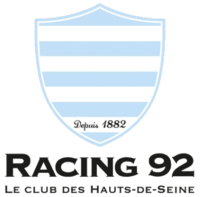 | |||
| Full name | Racing 92 | ||
|---|---|---|---|
| Nickname(s) |
Les Ciel et Blanc ("The sky-blues and whites") Les Racingmen | ||
| Founded |
1890 (Racing Club) 2001 (merged clubs) | ||
| Location | Colombes, France | ||
| Ground(s) | Stade Olympique Yves-du-Manoir (Capacity: 14,000) | ||
| President | Jacky Lorenzetti | ||
| Coach(es) | Laurent Labit and Laurent Travers | ||
| Captain(s) | Dimitri Szarzewski | ||
| League(s) | Top 14 | ||
| 2015–16 | Champions (regular season: 4th) | ||
| |||
| Official website | |||
|
www | |||
Racing 92 (French pronunciation: [ʁasiŋ ka.tʁə.vɛ̃.duz]) is a French rugby union club based in suburban Paris that was formed in 2001 with the collaboration of the Racing Club de France and US Métro. They were called Racing Métro 92 between 2001 and 2015, when they changed the name to Racing 92. "92" is the number of Hauts-de-Seine, a département of Île-de-France, bordering Paris to the west, where they play, and whose council gives financial backing to the club. They currently play in the Top 14, having been promoted as 2008–09 champions of Rugby Pro D2. Racing 92 play at the Stade Yves-du-Manoir stadium at Colombes, where the France national team played for several decades.
History

Racing Club was established in 1882 (it became Racing Club de France in 1885) as an athletics club, one of the first in France. New sections were regularly added thereafter (17 as of 2006, accounting for some 20,000 members). A rugby section was founded in 1890, which became an immediate protagonist of the early French championship and to which, until 1898, only Parisian teams were invited. On 20 March 1892 the USFSA organised the first ever French rugby championship, a one off game between Racing and Stade Français. The game was refereed by Pierre de Coubertin and saw Racing win 4–3."R.C. France 4 – Stade Francais 3". lnr.fr. Archived from the original on 25 November 2006. Retrieved 2 November 2006. Racing were awarded the Bouclier de Brennus, which is still awarded to the winners of the French championship today.
Both clubs would contest the championship game the following season as well, though in 1893 it would be Stade Français who would win the event, defeating the Racing Club 7–3. Stade went on to dominate the following years and the Racing Club would make their next final appearance in the 1898 season, where they met Stade yet again. However the title was awarded after a round-robin with six clubs. Stade Français won with 10 points, Racing came in second with 6.
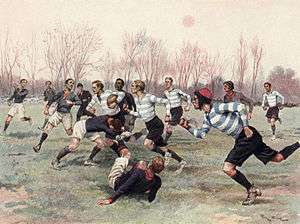
Racing contested the 1900 season final against the Stade Bordelais club, as provincial clubs had been allowed to compete in 1899. Racing easily won the match, defeating Stade Bordelais 37–7. The two clubs would meet again in the 1902 championship game, where Racing would again win, 6–0. A decade passed until Racing Club made another championship final, which would be on 31 March 1912, where they would play Toulouse in Toulouse. They lost the match 8–6.
Due to World War I the French championship was replaced with a competition called the Coupe de l'Espérance. The Racing Club won the competition in 1918, defeating FC Grenoble 22 points to 9. Normal competition resumed for the 1920 season. That season the Racing Club made their first final since 1912, though they lost 8 to 3 to Stadoceste Tarbais, a club from the Pyrénées.
After the 1920 season, the Racing Club would not win any championships for a number of years. In 1931 they created the Challenge Yves du Manoir competition. In the 1950s the club had some success, making their first championship final in 30 years, losing to Castres Olympique, 11 points to 8, becoming runners-up in the Challenge Yves du Manoir and winning the Challenge Rutherford in the 1952 season. After losing the 1957 final to FC Lourdes, the club then won the championship in the 1959 season, defeating Mont-de-Marsan 8 points to 3.
The Racing Club would next play in the championship final in the 1987 season, where they met Toulon at Parc des Princes in Paris. Toulon won the match 15 points to 12. Three seasons later the Racing Club defeated Agen 22 to 12 in Paris, capturing their first title since the 1959 season.
But in the wake of the 1990 title, Racing Club had a hard time adapting to the professional era and started to decline, until they were relegated to Division 2 at the end of the 1995–96 season. They jumped back to the top tier in 1998 but went down again in 2000 and played in Division 2 for most of the next decade. In 2001 the rugby section split off from the general sports club to merge with the rugby section of US Métro, the Paris public transport sports club, to form the current professional concern, known as Racing Métro 92. Both Racing Club de France and US Métro retained their other amateur general sports sections.
Racing 92's president is Jacky Lorenzetti, who heads a giant real estate company called Foncia. When Lorenzetti took over in 2006, the board set goals of bringing Racing into the Top 14 within the next two years and into the Heineken Cup by 2011. They missed their Top 14 goal by one year, not entering the top flight until 2009, but achieved their Heineken Cup goal by qualifying for the 2010–11 edition.
After 2003 the Challenge Yves du Manoir has been taken over by Racing Club as a youth competition for under 15s clubs. Racing Club de France provided 76 players to the national team, including 12 captains. It is second only to Stade Toulousain (almost 100) in that category. Three Racingmen played in France's first international match against the All Blacks on 1 January 1906. Laurent Cabannes, a France flanker, also played for Harlequins.
At the end of the 2014–15 season, the team's name was shortened from Racing Métro 92 to simply Racing 92.[1]
Identity
Aristocratic exclusivity
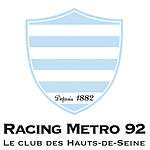
In France, early organised sport was a matter for rich people. Racing Club became the epitome of the exclusive athletics club, located in the heart of the Bois de Boulogne in the affluent western district of Paris. As the club's name, Racing, indicates, it was modelled after the fashionable English sports organisations, whose ideal of mens sana in corpore sano (a healthy mind in a healthy body) appealed very much to its members. Many of them were actually aristocrats, and four nobles took part in the first championship final. Although fewer aristocrats belong to the club now, it is still very complicated to join it, and the identity and image is one of exclusivity.
Racing Club has also always defended the amateur spirit of the game and of sports in general. The creation of the Challenge Yves du Manoir responded to this ideal in a period (late 1920s-early 1930s) where French rugby was marred by violence and creeping professionalism. Yves du Manoir symbolised the romantic side of rugby, its carefree dimension, le jeu pour le jeu (playing for the fun of playing).
Modern eccentricity
In a very different vein, much later, in the 1980s, a talented generation of players revived the club's spirit. They carried it back to the top of French rugby thanks to their performances on the pitch, but they also wanted to bring the fun back into the game, to take rugby out of its Parisian anonymity. They did so through a combination of serious football, humour and self-mockery. Their famous antics were invented by the club's backs (including France flyhalf Franck Mesnel and France wing Jean-Baptiste Lafond) who once played a game in Bayonne with berets on their heads as a tribute to the tradition of attacking play of the Basque club Aviron Bayonnais (11 Jan 1987). As members of a gang which they called le show bizz, they played other matches with black make-up on (10 April 1988 at Stade Toulousain), hair dyed yellow, bald caps (26 Feb 1989 against Béziers), wigs and even dressed up as pelote players (white shirts, black jackets and berets, again) in March 1990 at Biarritz Olympique. In April 1989, they wore long red and white striped shorts to celebrate the sans-culotte who took the Bastille on 14 July 1789. They wore long white trousers to look like players of old in the French championship semi-final on 26 April 1987—and won. Their best prank was in the next game though: they played the 1987 final against Toulon with a pink bow tie (2 May). Just before kick-off, Lafond presented French president François Mitterrand, who always attended the national final, with one of those bow ties. They lost that match but went on to play the 1990 final with the same bow ties. At half-time, they had a drink of champagne on the pitch to recover from the efforts of the first half—and won the club's most recent top-flight title!
They were also famous for their love of nightlife, which attracted a lot of criticism, especially because so many of them had international duties with France. All this contributed to the image of Racing Club as an eccentric institution, but these players have also been seen as trail blazers for Stade Français's president Max Guazzini, who a few years later, took up the provocative (such as the use of the pink colour) and imaginative spirit to boost his club's image and shake off the conservative traditionalism of French rugby.
As the club hit the front pages, five players capitalised on the success and went on to start a sportswear clothing business called Eden Park (after the famous Auckland stadium) in late 1987. Their development was boosted when the French Federation chose them as official suppliers of France's formal wear in 1998. The company has 270 outlets throughout the world. One of them is in Richmond as Eden Park developed a partnership with Harlequins. Others are to be found in Northampton, Leeds, Belfast, Dublin and Cardiff. In 2003, Eden Park became the official supplier of the Welsh Rugby Union's formal wear for the World Cup in Australia. Eden Park is also directly involved in the Racing 92 club since one of its founders, Eric Blanc—who happens to be Franck Mesnel's brother-in-law, is the club's vice-president.
This particular period ended in the early 1990s when those players left the club. Racing then spent several years in the second division, but retained plenty of ambition. In 2007–08, Racing finished second on the ladder to equally ambitious Toulon, but fell short of promotion with an extra-time loss to Mont-de-Marsan in the Pro D2 promotion playoff final. The following year saw Racing's ambitions realised with a romp to the Pro D2 crown, clinching promotion with four rounds to spare.
In their return to the top flight in 2009–10, Racing finished sixth on the regular-season table, two spots ahead of their Parisian rivals, securing the final spot in the newly expanded playoffs—despite actually being outscored by their opponents on the season. This finish also gave Racing a place in the 2010–11 Heineken Cup. Their season ended with a 21–17 first-round loss at eventual champions Clermont. The 2010–11 season saw Racing emphatically, though only temporarily, reestablish themselves as the top club in Paris, finishing second on the regular-season table to Stade Français' 11th.[2]
Lorenzetti's model for success has been to combine young French talent with big-name imports. More significantly, while he has largely bankrolled the team during the first years of his tenure as president, he is committed to making the club self-supporting. To that end, he is building a new 32,000-seat stadium for the club in the Paris suburb of Nanterre, near La Défense. The new ground, currently known as Arena 92 and set to open in late 2016, is being marketed as a future venue for major concerts, which would potentially provide Racing with substantial non-match revenue.
Racing made major headlines in December 2014, announcing that it had signed All Blacks fly-half Dan Carter, also the all-time leading points scorer in international rugby, to a three-year deal effective after the 2015 Rugby World Cup. The contract will reportedly make Carter the first player in rugby history to make £1 million (€1.3 million at late-2014 exchange rates) a season,[3] with reports of his annual salary as high as £1.3 million (€1.7 million).[4] When the signing was announced, Lorenzetti said, "Carter will be the best-paid player at Racing but also the least expensive because of the economic benefits."[4] Carter will also fill the void at fly-half to be left by the return of Jonathan Sexton to his homeland of Ireland at the end of the 2014–15 season.[4]
Honours
- European Rugby Champions Cup
- Finalist: 2016
- French championship
- Champion: 1892, 1900, 1902, 1959, 1990, 2016
- Finalist: 1893, 1912, 1920, 1950, 1957, 1987
- Challenge Yves du Manoir
- Finalist: 1952
- Champion under 15: 2005
- Coupe de l'Espérance
- Champion : 1918
- Division One Group A2/Rugby Pro D2
- Champion: 1998, 2009
- Challenge Rutherford
- Finalist: 1952
Finals results
European Rugby Champions Cup
| Date | Winner | Runner up | Score | Venue | Spectators |
| 14 May 2016 | Saracens | Racing 92 | 21–9 | Grand Stade de Lyon, Décines | 58,017 |
French championship
| Date | Winner | Runner up | Score | Venue | Spectators |
| 20 March 1892 | Racing Club de France | Stade Français | 4–3 | Bagatelle, Paris | 2,000 |
| 19 May 1893 | Stade Français | Racing Club de France | 7–3 | Bécon-les-Bruyères | 1,200 |
| 22 April 1900 | Racing Club de France | Stade Bordelais UC | 37–3 | Levallois-Perret | 1,500 |
| 23 March 1902 | Racing Club de France | Stade Bordelais UC | 6–0 | Parc des Princes, Paris | 1,000 |
| 31 March 1912 | Stade Toulousain | Racing Club de France | 8–6 | Stade des Ponts Jumeaux, Toulouse | 15,000 |
| 25 April 1920 | Stadoceste Tarbais | Racing Club de France | 8–3 | Route du Médoc, Le Bouscat | 20,000 |
| 16 April 1950 | Castres Olympique | Racing Club de France | 11–8 | Stade des Ponts Jumeaux, Toulouse | 25,000 |
| 26 May 1957 | FC Lourdes | Racing Club de France | 16–13 | Stade de Gerland, Lyon | 30,000 |
| 24 May 1959 | Racing Club de France | Stade Montois | 8–3 | Parc Lescure, Bordeaux | 31,098 |
| 22 May 1987 | RC Toulon | Racing Club de France | 15–12 | Parc des Princes, Paris | 48,000 |
| 26 May 1990 | Racing Club de France | SU Agen | 22–12 (aet) | Parc des Princes, Paris | 45,069 |
| 24 June 2016 | Racing 92 | RC Toulon | 29–21 | Camp Nou, Barcelona | 99,124 |
Challenge Yves du Manoir
| Year | Winner | Score | Runner-up |
| 1952 | Section Paloise | round robin | Racing Club de France |
Coupe de l'Espérance
| Date | Winner | Score | Runner-up |
| 1918 | Racing Club de France | 22–9 | FC Grenoble |
Pro D2 promotion playoffs
| Date | Winner | Runner up | Score | Venue | Spectators |
| 21 June 2008 | Stade Montois | Racing Metro 92 | 32–23 (aet) | Stade Municipal de Beaublanc, Limoges | 6,000"Pro D2 Finale : Mont-de-Marsan – Racing Metro 92". L'Équipe (in French). France. 21 June 2008. Retrieved 9 May 2009. |
Current standings
| |||||||||||||||||
| Club | Played | Won | Drawn | Lost | Points For | Points Against | Points Diff. | Tries For | Tries Against | Try Bonus | Losing Bonus | Points | |||||
|---|---|---|---|---|---|---|---|---|---|---|---|---|---|---|---|---|---|
| 1 | Clermont | 13 | 8 | 2 | 3 | 378 | 286 | +92 | 38 | 29 | 3 | 2 | 41 | ||||
| 2 | Montpellier | 13 | 8 | 0 | 5 | 318 | 253 | +65 | 26 | 21 | 3 | 2 | 37 | ||||
| 3 | La Rochelle | 13 | 6 | 3 | 4 | 312 | 265 | +47 | 30 | 19 | 3 | 3 | 36 | ||||
| 4 | Toulon | 13 | 7 | 1 | 5 | 336 | 266 | +90 | 32 | 25 | 4 | 2 | 36 | ||||
| 5 | Bordeaux | 13 | 8 | 0 | 5 | 316 | 297 | +19 | 27 | 26 | 1 | 1 | 34 | ||||
| 6 | Castres | 13 | 7 | 1 | 5 | 335 | 259 | +76 | 29 | 18 | 2 | 2 | 34 | ||||
| 7 | Toulouse | 13 | 7 | 0 | 6 | 272 | 252 | +20 | 25 | 18 | 2 | 3 | 33 | ||||
| 8 | Racing | 13 | 7 | 1 | 5 | 291 | 285 | +6 | 29 | 24 | 2 | 0 | 32 | ||||
| 9 | Stade Français | 13 | 6 | 1 | 6 | 338 | 313 | +25 | 33 | 26 | 2 | 1 | 29 | ||||
| 10 | Brive | 13 | 6 | 1 | 6 | 288 | 341 | –53 | 19 | 31 | 0 | 1 | 27 | ||||
| 11 | Pau | 13 | 5 | 0 | 8 | 296 | 342 | –46 | 27 | 31 | 1 | 4 | 25 | ||||
| 12 | Lyon | 13 | 4 | 2 | 7 | 263 | 298 | –35 | 19 | 23 | 1 | 3 | 24 | ||||
| 13 | Bayonne | 13 | 3 | 2 | 8 | 188 | 341 | –153 | 11 | 33 | 0 | 0 | 16 | ||||
| 14 | Grenoble | 13 | 2 | 0 | 11 | 297 | 430 | –193 | 28 | 40 | 1 | 5 | 14 | ||||
|
If teams are level at any stage, tiebreakers are applied in the following order:
| |||||||||||||||||
| Green background (rows 1 and 2) receive semi-final play-off places and receive berths in the 2017–18 European Rugby Champions Cup. Blue background (rows 3 to 6) receive quarter-final play-off places, and receive berths in the Champions Cup. Yellow background (row 7) advances to a play-off for a chance to compete in the Champions Cup. Plain background indicates teams that earn a place in the 2017–18 European Rugby Challenge Cup. Red background (row 13 and 14) will be relegated to Rugby Pro D2. Final table | |||||||||||||||||
Current squad
2016-17 Note: Flags indicate national union as has been defined under WR eligibility rules. Players may hold more than one non-WR nationality.
Staff
- President:
 Jacky Lorenzetti
Jacky Lorenzetti - Vice-Presidents:
- general manager:
- Forwards Coach:
 Laurent Travers
Laurent Travers - Backs Coach:
 Laurent Labit[5]
Laurent Labit[5] - Kicking coach:
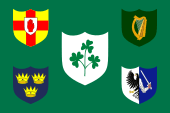 Ronan O'Gara
Ronan O'Gara
Notable current and past players
-
 Manuel Carizza
Manuel Carizza -
 Álvaro Galindo
Álvaro Galindo -
 Juan Martin Hernandez
Juan Martin Hernandez -
 Juan José Imhoff
Juan José Imhoff -
 Juan Pablo Orlandi
Juan Pablo Orlandi -
 Agustin Pichot
Agustin Pichot -
 Nic Berry
Nic Berry -
 Olly Barkley
Olly Barkley -
 Dan Scarbrough
Dan Scarbrough -
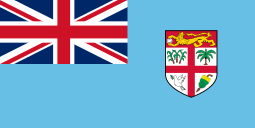 Sireli Bobo
Sireli Bobo -
 Sakiusa Matadigo
Sakiusa Matadigo -
 Josh Matavesi
Josh Matavesi -
 Jone Qovu
Jone Qovu -
 Simon Raiwalui
Simon Raiwalui -
 Albert VuliVuli
Albert VuliVuli -
 Wladimir Aïtoff
Wladimir Aïtoff -
 Georges André
Georges André -
 Marc Andreu
Marc Andreu -
 Alexandre Audebert
Alexandre Audebert -
 David Auradou
David Auradou -
 Louis Béguet
Louis Béguet -
 Laurent Benezech
Laurent Benezech -
 Léon Binoche
Léon Binoche -
 Mathieu Blin
Mathieu Blin -
 Eric Bonneval
Eric Bonneval -
 François Borde
François Borde -
 René Boudreaux
René Boudreaux -
 Adolphe Bousquet
Adolphe Bousquet -
 Guillaume Boussès
Guillaume Boussès -
 Julien Brugnaut
Julien Brugnaut -
 Marcel Burgun
Marcel Burgun -
 Laurent Cabannes
Laurent Cabannes -
 Fernand Cazenave
Fernand Cazenave -
 Sébastien Chabal
Sébastien Chabal -
 Denis Charvet
Denis Charvet -
 Henry Chavancy
Henry Chavancy -
 André Chilo
André Chilo -
 Jean Collas
Jean Collas -
 Patrice Collazo
Patrice Collazo -
 René Crabos
René Crabos -
 Michel Crauste
Michel Crauste -
 Paul Decamps
Paul Decamps -
 Luc Ducalcon
Luc Ducalcon -
 Nicolas Durand
Nicolas Durand -
 Yves du Manoir
Yves du Manoir -
 Fabrice Estebanez
Fabrice Estebanez -
 Benjamin Fall
Benjamin Fall -
 Jean-Pierre Genet
Jean-Pierre Genet -
 Charles Gondouin
Charles Gondouin -
 Pierre Guillemin
Pierre Guillemin -
 Adolphe Jauréguy
Adolphe Jauréguy -
 Adolphe Klingelhoefer
Adolphe Klingelhoefer -
 Jean-Baptiste Lafond
Jean-Baptiste Lafond -
 Fabrice Landreau
Fabrice Landreau -
 Gaston Lane
Gaston Lane -
 Wenceslas Lauret
Wenceslas Lauret -
 Hubert Lefèbvre
Hubert Lefèbvre -
 Bernard Le Roux
Bernard Le Roux -
 Thomas Lombard
Thomas Lombard -
 Maxime Machenaud
Maxime Machenaud -
 Gérald Martinez
Gérald Martinez -
 Franck Mesnel
Franck Mesnel -
 Lionel Nallet
Lionel Nallet -
 Benjamin Noirot
Benjamin Noirot -
 Robert Paparemborde
Robert Paparemborde -
 Alexandre Pharamond
Alexandre Pharamond -
 Étienne Piquiral
Étienne Piquiral -
 Adrien Planté
Adrien Planté -
 Alain Porthault
Alain Porthault -
 Frantz Reichel
Frantz Reichel -
 Jean-Pierre Rives
Jean-Pierre Rives -
 André Roosevelt
André Roosevelt -
 Émile Sarrade
Émile Sarrade -
 Julien Saubade
Julien Saubade -
 Laurent Sempéré
Laurent Sempéré -
 Dimitri Szarzewski
Dimitri Szarzewski -
 Franck Tournaire
Franck Tournaire -
 Mikaele Tuugahala
Mikaele Tuugahala -
 Ludovic Valbon
Ludovic Valbon -
 Jonathan Wisniewski
Jonathan Wisniewski -
 David Khinchagishvili
David Khinchagishvili -
 Mirco Bergamasco
Mirco Bergamasco -
 Santiago Dellape
Santiago Dellape -
 Carlo Festuccia
Carlo Festuccia -
 Andrea Lo Cicero
Andrea Lo Cicero -
 Andrea Masi
Andrea Masi -
 Michael Carroll
Michael Carroll -
 Jonathan Sexton
Jonathan Sexton -
 Johnny Leo'o
Johnny Leo'o -
 Andrew Mehrtens
Andrew Mehrtens -
 Brent Ward
Brent Ward -
 Carlos de Candamo
Carlos de Candamo -
 Jacques Cronjé
Jacques Cronjé -
 Juandré Kruger
Juandré Kruger -
 Willie le Roux
Willie le Roux -
 Brian Mujati
Brian Mujati -
 François Steyn
François Steyn -
 Lucian Sirbu
Lucian Sirbu -
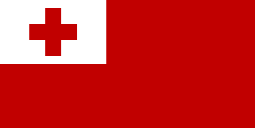 Soane Tonga'uiha
Soane Tonga'uiha -
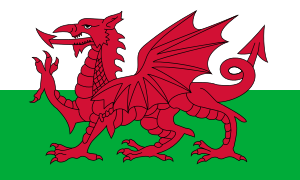 Dan Lydiate
Dan Lydiate -
 Jamie Roberts
Jamie Roberts -
 Mike Phillips
Mike Phillips -
 Luke Charteris
Luke Charteris
Chairmen
| Years | Name | Club | Section |
| 2004 – ...... | Jean-Patrick Lesobre | Racing Club de France | Amateurs |
| 2006 – ...... | Jacky Lorenzetti | Racing Metro 92 | Professional |
See also
References
- ↑ "Le Racing Metro 92 devient Racing 92" (Press release) (in French). Racing 92. 10 June 2015. Retrieved 10 June 2015.
- ↑ Moriarty, Ian (17 May 2011). "Times are changing in Paris". ESPN Scrum. Retrieved 17 May 2011.
- ↑ "Money lured Carter to Racing Metro". ESPN Scrum. 18 December 2014. Retrieved 18 December 2014.
- 1 2 3 Hamilton, Tom (18 December 2014). "Carter leads migration for lucrative swansong". ESPN Scrum. Retrieved 18 December 2014.
- ↑ "About". ercrugby.com. Retrieved 3 November 2013.
External links
| Wikimedia Commons has media related to Racing 92. |
- Racing 92 Official website